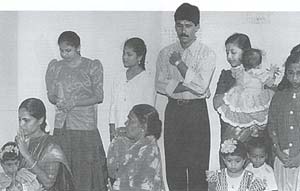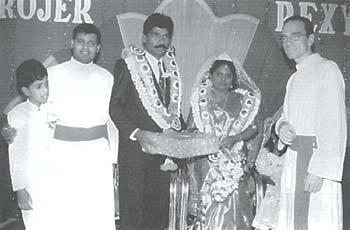Letter from India
This article is taken from the Letter from India, November-December 1999,
by Rev. Fr. Thomas Blute.
He deals here with arranged marriages as practiced in India,
and the Indian customs associated with the celebration of marriages.
It is significant that I begin, and hope to finish, this letter today (I failed), on the Feast of St. Francis Xavier. Only after encountering India can one begin to appreciate the greatness of this apostle. His loneliness, language difficulties, health and diet problems must have been staggering, making our small burdens seem trivial. I have every reason to hope that he is still in the fight, helping us from his lofty place.
I have pointed out many times how living in a new and strange culture opens one's eyes to different aspects of human nature. Also, being in India, one is "in touch with" a civilization that pre-dates Christianity. So if you really would like to know how things "used to be," it is probably the best place to start.
The marriage customs in India always provoke discussion. I have wanted to write about this for a long time, because of its relevance, its shock-value, and the valuable lessons I have drawn from it.
| Both the bride and groom are blessed, and sprinkled with holy water by the father, mother, uncles, aunts, and elders all before going off to meet their future spouse at the wedding. |
|
The interesting thing in Indian marriages is that they are arranged by the parents! When a girl approaches marriage-age, her father will decide when it is time, and they will begin shopping. Often introductions begin with friends and family (first cousins commonly marry here), or the parents might have even had their eyes on a boy for years, watching him grow and mature into a suitable young prospective son-in-law. They always marry within their caste. If they are new to the town, they can consult the marriage want-advertisements in the paper. A full two pages of small print for "Brides Wanted," and a full two pages of "Grooms Wanted," sorted by caste, language, etc. The advertisements will give such important information as age, education, and complexion. And, of course, a contact phone, letter box, or address.

These are the gifts offered symbolically to the couple before marriage:
a sari, coconuts, beter leaves, milk, etc.
But marriage is such an important thing, shouldn't it be left to the professionals? Indeed, to this day there are marriage brokers, middle-men who earn their living by searching out suitable spouses. The parents engage him for a fee and tell him their requirements. When he has found several candidates, the introductions begin. Of course, the match-maker gets a portion of the dowry.
The parents will make discreet inquiries about the character of the boy, and when they are satisfied that it would be a good "alliance," they invite his family to visit. The boy (young man, actually) and his parents speak together; the girl typically will sit lower, or on the floor, dressed fine, with gold chains in evidence. She generally says nothing, unless asked. Then she will go out of the room, and the parents will go further with the preparations, speaking about important matters like dowry, wedding expenses, etc. The bride's family must pay an enormous dowry to "get her married properly." Often more than $3,000 cash, plus some small gold bars, gold chains, and, if the family of the bride is well off, even a scooter, or a car. An acquaintance once told me the dowry given by one screen-actress to a well-employed engineer. "A Maruti car, a house in Juhu, 3 lakhs rupees," here he smacks his lips, adding, "and 75 gold sovereigns!" The wedding expenses are born some by the groom, but mostly by the bride's family, and when you see how lavishly they celebrate, you know it is not cheap!

The two families spend the whole night before in prayer.
Over the following days, or weeks, the business is finalized, and preparations for the marriage begin. Within several weeks, perhaps two months, all is completed, and in a pageant-like series of beautiful ceremonies, the couple is united in marriage. It is not uncommon for them to meet just a few days before marriage—or even at the marriage hall itself! Of course, they have swapped photos, and letters, and perhaps phone calls.
I emphasize the following things, most shocking to the (corrupted, liberal) Western mind: There is no dating, or "socializing" between boys and girls; the two to get married scarcely see each other before they get married; the bride will often be asked if she likes the man, but the final choice is definitely up to the father. Also, the girls MUST preserve their virginity until marriage—a non-virgin will never be accepted.
There is romance, there is emotion—there's just no pre-marital foolishness. Because this system is acceptable to the whole society, their understanding of the nature of marriage is different: They don't marry the one they LOVE...THEY LEARN TO LOVE THE ONE THEY MARRY.
And there is no divorce. Arranged marriages account for almost all of the marriages in India, and they are rock-solid. So-called "love-marriages" are a disgrace to the family, and looked upon as unstable, and likely to break up. Furthermore, in the more Westernized cities, like Madras, Bombay, Calcutta, in those places you also find more "love marriages," and rising divorce rates.

The bride and groom are garlanded with flowers.
There are good points and bad points that I find in this system. But before you condemn me as hopelessly inculturated, go read some Victorian novels, or some Renaissance literature, or Middle Age ballads, and you will find that arranged marriages have also been our heritage until recent times.
 |
The first question is: Don't the girls object to "being treated like cattle"? I had the chance to interview some well-educated lady teachers, whose parents had decided "it was time." They all said that "surely their parents know more about what makes a good husband than they," and "they love me, and will choose the right man..." There was no shadow of compulsion, no desire to "do it themselves," just humble trust.
The second question is: How can we account for the stability of arranged marriages, especially compared with the divorce-rate of the enlightened West? Well, in the Indian family (as in Christian families of old), the children are brought up with a strong respect for the authority of their parents, so that even fully grown men will take their papa's blessing before leaving the house, ask permission to go, and be back before 9 p.m. It is a generalization, and a bit idealized, but you get my point. And the young couple is surrounded by their in-laws, whose honor and family name are at stake. If they start to have problems, both sets of parents will step in and oblige them to stay together. If the young wife shows up on her mother's doorstep, her mother will be angry and say "Get back to your husband!" Likewise, if the young man takes off, his father will reproach him with "You don't accept the girl I CHOSE for you?!" There is no sympathy for them, no alternatives: they must stick it out, and make it work. (Actually, I must add here that the attitude they take towards marriage makes it less difficult than for a Western couple. First of all, the roles of man and wife are not confused, and each of them knows and accepts what the other should be doing. The territory, so to speak, is carefully mapped out, and even from day one, each plays the appointed role. Each new couple doesn't have to re-invent marriage—they don't have to discover their territories or come to a truce as to their different related jobs. Therefore, they avoid civil war and the consequent crippling wounds inflicted on a young marriage. This practice of arranged marriages affects everything, because marriage is related to everything, as the beginning and end of all mortals. So just to note the contrast, let me share with you some of the cultural things which I have noticed:
-
When growing up, boys play with boys, and girls play with girls. This is the natural order of things. The original meaning of "promiscuity" is actually "mixing together." The "mixing together" of boys and girls without reason leads without fail to "promiscuity" in the modern sense of the word.
-
The girls seem to "begin" their life with marriage. The years before are spent in preparation for that. They don't go out unaccompanied, even less so at night, never in the company of young men not their brothers.
-
The man is the breadwinner, and the woman the homemaker. Women often work by necessity, especially in the lowest classes, but if at all possible, when children come, they will quit and tend to the care of the children.

A close up of the gifts.
You might ask me if I would advocate a return to "arranged marriages" in the West. Most emphatically I would say NO! The reason it works in India is because everyone plays the game, and the minds and lives of the people are formed around the notion of arranged marriages. It would be impossible to bring about artificially a situation where everyone would suddenly accept different customs and norms of behavior in a realm where basic notions are not taught, but learned at home, in one's own family circle.
Also, there are problems with the system of arranged marriages as practiced in South India, which almost nullifies all the good things I have spoken about so far. You see, the cherished honor of a man, his good name before his peers, will depend in a large part upon whether he marries his daughters well and properly. Society sits in judgment on the whole wedding process, and a father who doesn't marry his daughters well will be scorned and mocked, as only village-dwellers know how to scorn and mock. The most available evidence for public view is whether the groom is well-to-do, with a good job, and whether the celebrations are grand enough. The dowry, then, becomes the "bait" to catch a good groom. The parents who are looking to get their son married want a bride who is (1) rich and (2) educated. The groom himself wants her to be (1) beautiful, (2) a good cook and (3) rich. If she is rich enough, they don't care whether she is beautiful or educated, you see?? Cooking she can learn, and beauty fades, but gold always shines! Please don't be startled by the humorous tone of this letter; but you should know that there are plenty of young men who will "shop around" extensively for the most profitable alliance. I have heard of young men who, upon discovering that the girl was not actually rich enough, or had no gold chains, immediately stands up and excuses himself, calling the negotiations to an end. (I speak generally: of course there are lots of exceptions.) So the father of the bride-to-be must ruin himself financially to get his daughters married. The amount of dowry money has risen so high that a man who earns $300 per year must give $2,500 cash and as many as 50 sovereigns of gold to the groom as a dowry. Also, the father must be sure that his daughter has at least three heavy gold chains, and a costly sari to greet potential buyers in. Once the "deal" has been secured, Dad must shell out fantastic sums to rent the marriage hall, hire a band, decorations, and a feast for as many people as come. (Never less than 200.) When you know how little they actually earn, you begin to see the damage such a system does to the family.

The bride and groom with Fr. Edwin and Fr. Vachon in attendance.
Parents will borrow heavily, or even sell their land or house, or all the mother's jewelry, to pay for the daughter's wedding. Even poor families will utterly ruin themselves providing all the funds for a lavish marriage. Sometimes they are fortunate to have several boys in the family: when the boys get married, the parents collect all the cash and gold and use it to get their girls married off! But imagine, now, the sorrow of a man whose first child is a girl. Immediately the prospect of a future marriage looms. Then the second daughter arrives, and a third. The poor man is ruined. Let me remind my readers that India is a pagan country, before I continue: Christians number only 2percent of the population, and the true liberation of women effected by grace has not taken place. So in the country regions, the ratio of boys to girls can sometimes be increased as high as 3 to 2 by the abhorrent practice of female infanticide. I have been told that doctors are forbidden by law to reveal the sex of a child to the parents, for example, by ultrasound determinations. Why? Because the parents might just try to evade the inevitable hardships brought on by having girl children.
In conclusion, I repeat what I said in the beginning: one can learn a lot about human nature by seeing how other cultures live and function. If there is one lesson I have learned which I would share with young people abroad, it is this: "LUV," that is, the emotional bonds between a boy and a girl, is not the most necessary thing in choosing a spouse. In fact, it is almost completely unnecessary, provided one is committed to falling in love after marriage. Emotions are very unstable things upon which to make a judgment about marriage. The most important preliminaries for a stable marriage seem to be (1) the judgment of mature people who love you (your parents), and (2) a mutual understanding in husband and wife as to the duties and responsibilities of each. But if total strangers can meet, get married, and stay together, as they do here, why cannot Christians, who marry with love, do the same? The answer: lack of commitment to make the marriage work.
In Christ,
Fr. Thomas Blute

